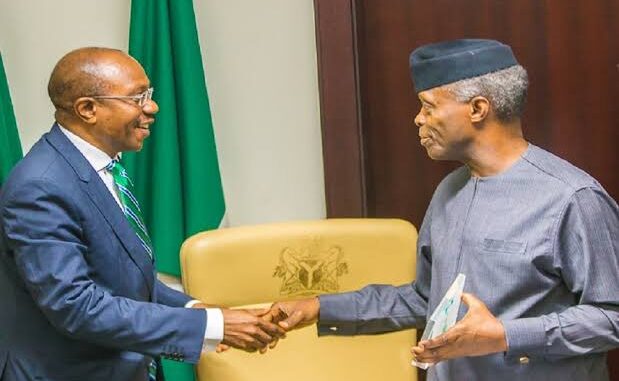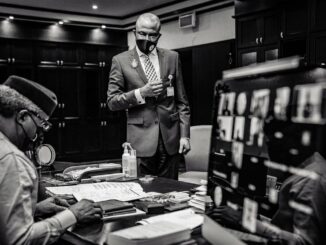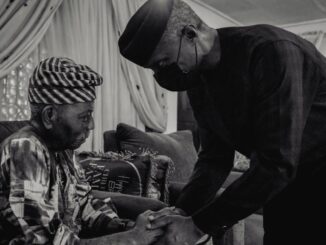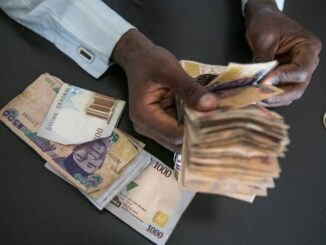
By Oluwafemi Popoola
There is no way one can extricate the Central Bank of Nigeria (CBN) governor, Godwin Emefiele, from the behemoth of the catastrophe that has befallen our Naira. The CBN boss needs to explain to Nigerians the reasons for the rapid depreciation of the value of the Naira. The nosediving fall of the Naira to the Dollar at present is at an unprecedented rate of N710 to US$1. Shall we call this a product of the failure of an institution that the CBN represents under the stewardship of the banker?
Every government around the world has two policy tools for managing its macro-economic situation. They are Fiscal and Monetary Policies. Fiscal Policy refers to the government’s decisions about taxation and spending, while Monetary Policy refers to the Central Bank activities that are directed toward influencing the quantity of money and credit in an economy. Both Monetary and Fiscal policies are used to regulate economic activities over time.
A nation’s Forex Management is a critical component of its monetary policy which is managed by its Apex Bank. Central Banks globally by Law and by Convention are autonomous of the nation’s political leadership. Hence, there is no direct interference in its day-to-day activities, though the President as the head of government and the country’s chief security officer knows when to come in, it is not a call of the Vice President except functioning in the acting capacity for the President. In essence, with powers fully separated, the Executive have no say in how the CBN Governor runs or manages the nation’s Monetary policy.
ALSO READ: Osinbajo to CBN: Review forex management strategy, synergize on fiscal, monetary policies
Still, the Vice President, Prof Osinbajo, had, on different occasions made recommendations to the CBN authorities for better management of the country’s financial matters, the latest being on October 11, 2021, when he advised the Emefiele-led CBN to have a “rethink” about its current Forex demand management strategy.
Vice President Osinbajo gave the advice when he spoke at the 2021 Mid-Term Ministerial Performance Review Retreat where he criticised the foreign exchange policy adopted by the Central Bank of Nigeria, noting that the exchange rate was artificially low and did not reflect the current market realities. He, however, advised the CBN to adjust the official exchange rate of the Naira in a realistic manner that will attract Forex inflow into the country.
Osinbajo also lamented the lack of access to Forex for importation purposes, especially of raw materials as one of the contributory factors to the current economic situation. The big question is, does Emefiele take to the VP’s advice? the answer seems No.
As it stands, VP Osinbajo’s stance on the Forex exchange policy has always been a system that reflects the activities of the market. It is not something new that Nigeria has been having difficulty in earning foreign exchange due to the sharp drop in the price of crude in the international market.
Over the years, the only way the Central Bank has been managing this crisis is to defend the Naira by pumping more dollars into the market. While this defence policy of the CBN isn’t a bad idea but its weakness in bolstering the parallel market has given more room for speculators to manipulate the market.
The Vice President’s position, therefore, has been that of flexible and transparent means of ascertaining the value of the Naira. A system where the wide gap between the official parallel rate of the Naira to a Dollar is close to the barest minimum. No serious nation has two separate FX rates for its currency. It spells doom for the economy. It is like leaving the country to the mercy of a few speculators.
Earlier before now, one can recall that on February 16, 2017, as Acting President, Prof Osinbajo presiding over the first National Economic Council (NEC) meeting of the year, he directed the Central Bank of Nigeria to review the foreign exchange policy.
The meeting resolved that fresh $250 million be injected into the Sovereign Wealth Fund (SWF). The CBN subsequently released about $500 million through the inter-bank market where the 23 banks bought $371 million. As a result, there were indications that the weakened Naira currency was showing small signs of recovery after the Central Bank had moved to ease some foreign exchange restrictions. Days later, the Naira was strengthened to about N480 to the US Dollar on the black market after being N520 and even higher in previous weeks.
Reacting, Fitch’s BMI Research said the policy was like “a precursor to a more meaningful move in the exchange rate” given the yawning gulf between parallel rates and the official inter-bank rate of N305.
If Emefiele still listens to advice, here is mine for him. You can’t fix the price of a product you are not in control of its supplies, it will only give room for sharp practices like speculating and round-tripping. As a regulator, stay in your lane and make sure there is law and order in the market you are assigned to regulate. Like Prof Osinbajo said in a piece of advice he gave the CBN, let the price of the Dollar reflect market realities. That’s how we will know where to start fixing our FX problems.




